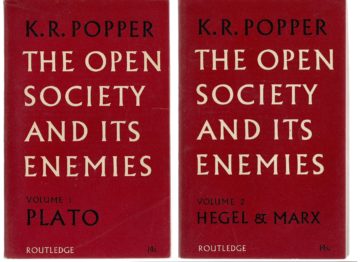Tae-Yeoun Keum at Hedgehog Review:
 Today, The Open Society and Its Enemies is perhaps best remembered for two things: Karl Popper’s coinage of the terms “open society” and “closed society,” and his scorched-earth attack on Plato as the original architect of the latter. For Popper, Plato was the first and the most influential authoritarian thinker. (Popper’s analogous charges against Aristotle, Marx, and Hegel have not proven as memorable.)
Today, The Open Society and Its Enemies is perhaps best remembered for two things: Karl Popper’s coinage of the terms “open society” and “closed society,” and his scorched-earth attack on Plato as the original architect of the latter. For Popper, Plato was the first and the most influential authoritarian thinker. (Popper’s analogous charges against Aristotle, Marx, and Hegel have not proven as memorable.)
Popper conceived of the difference between open and closed societies as a difference in their respective cultures of knowledge. Open societies were distinguished by their democratic culture of criticism, which made commonly held beliefs available for critique and revision, and in so doing, embraced innovation. Closed societies, by contrast, lacked this “critical attitude.” They were instead sustained by the “dogmatic” power of myths, which preserved existing power structures and stifled social change.
more here.
